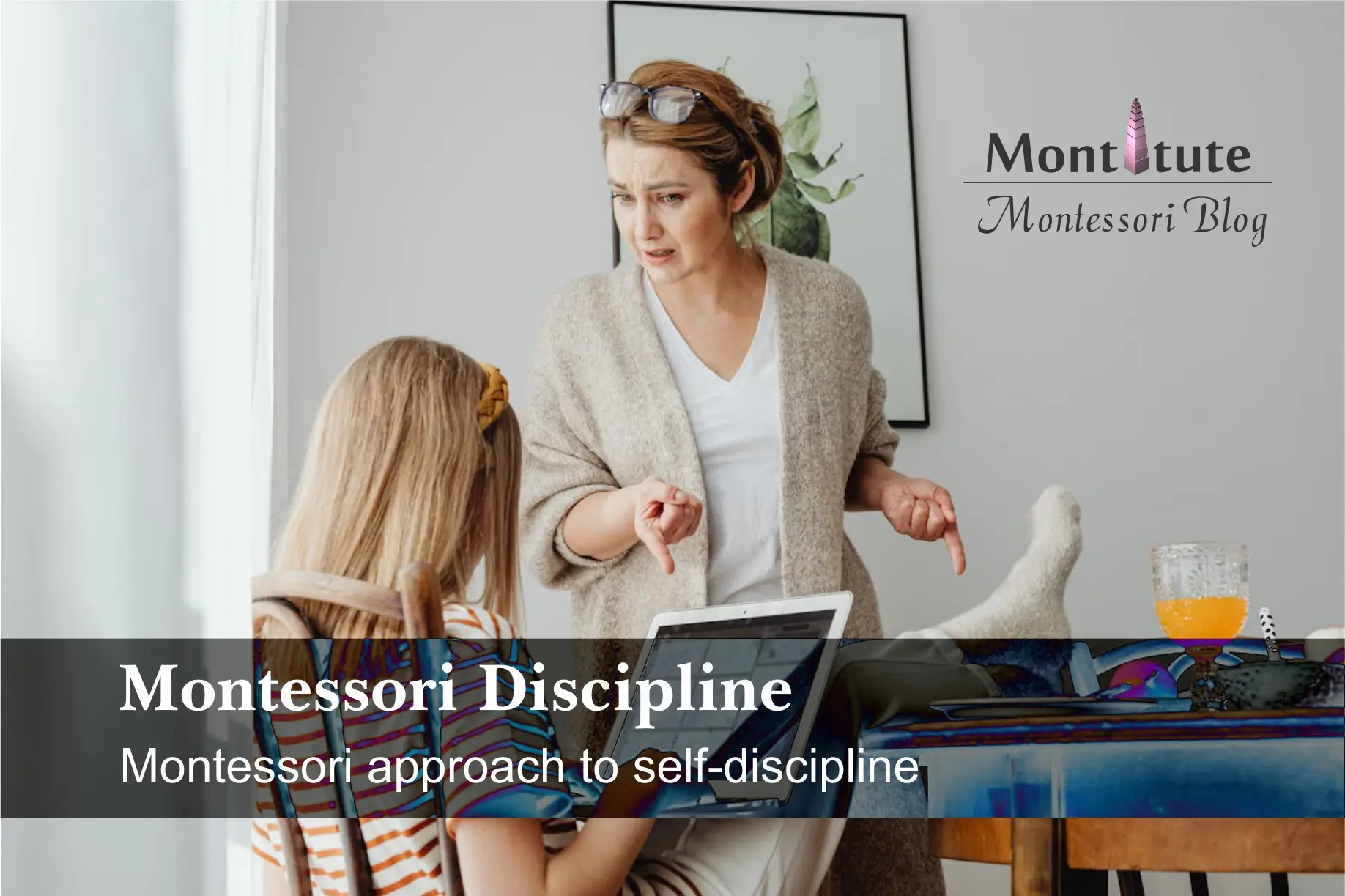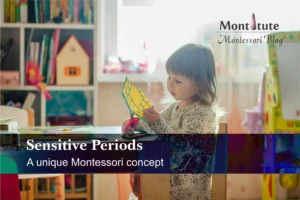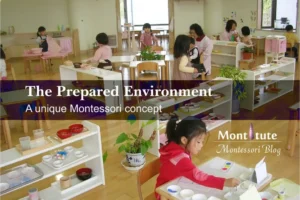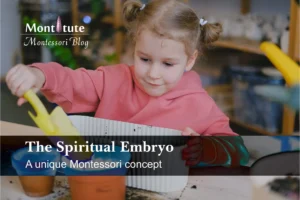
Montessori Discipline
- Posted by Montitute
- Categories Montessori Education, Blog
- Date June 18, 2025
- Comments 0 comment
Montessori Discipline
Guiding the Child Toward Inner Peace and Responsibility
Discipline is often misunderstood. In many traditional settings, it is associated with punishment, obedience, and adult control. But in the Montessori approach, discipline is not something imposed on the child—it is something cultivated within the child. It’s about developing self-control, respect, and a sense of responsibility for oneself and others.
Dr. Maria Montessori saw discipline not as the suppression of behavior, but as the flowering of inner order. Montessori discipline is rooted in the belief that children naturally seek to grow, cooperate, and contribute meaningfully when they are supported in a respectful and prepared environment.
In this guide, we will explore what Montessori discipline really means, how it develops in early childhood, and how parents and educators can foster it in daily life.
What Is Montessori Discipline?
At its heart, Montessori discipline is about self-discipline—the child’s ability to regulate their own behavior, make thoughtful choices, and live in harmony with others. It is developed through experience, not enforcement.
This kind of discipline:
- Arises from within, rather than being imposed from the outside.
- Is connected to the child’s growing sense of independence and responsibility.
- Emphasizes respect for oneself, others, and the environment.
- Is nurtured through freedom within limits, not rigid control.
In the Montessori environment, discipline is not about fear or obedience. It is about helping the child learn to act with intention, concentration, and grace.
The Foundations of Discipline in the Montessori Philosophy
Respect for the Child
Montessori discipline begins with deep respect for the child as a capable, intelligent, and worthy human being. This respect is not passive—it is expressed through how we listen, observe, and interact.
When children feel respected:
- They are more likely to cooperate.
- They internalize respectful behavior by experiencing it.
- They build self-esteem and confidence.
Freedom Within Limits
Children in a Montessori environment are given meaningful freedom—but within clearly defined boundaries. This freedom is not chaotic. It is structured in a way that allows the child to make choices while learning how those choices affect others.
Example:
- A child is free to choose any work from the shelf (freedom), but they must return it properly when they are done (limit).
- A child may walk around the room (freedom), but not run or disturb others (limit).
This balance supports the development of responsibility and natural consequences, which are far more effective than arbitrary rules or punishments.
The Prepared Environment
The Montessori classroom—or home—is carefully designed to encourage independence, order, and concentration. When the environment is consistent and orderly, the child feels secure and focused. This supports internal order, which is the basis of discipline.
Features of a prepared environment:
- Everything has a place and a purpose.
- Materials are age-appropriate and self-correcting.
- The space is calm, uncluttered, and inviting.
- Children are free to move and work independently.
A disorganized or overstimulating environment can lead to frustration, disobedience, or aimlessness. A well-prepared space, on the other hand, invites purposeful behavior.
The Role of the Adult
Montessori adults (teachers and parents) are guides, not enforcers. Their role is to model respectful behavior, offer gentle redirection, and provide clear, consistent boundaries.
A Montessori adult:
- Observes rather than dominates.
- Offers help only when needed.
- Encourages problem-solving and reflection.
- Responds to behavior with calm, empathy, and patience.
Instead of punishing, the adult supports the child in understanding their actions, making amends, and trying again.
How Montessori Discipline Develops in Early Childhood
Discipline is not something that happens overnight. It develops gradually and naturally, like language or movement. Maria Montessori identified stages of discipline, beginning in early childhood and evolving into maturity.
From External to Internal Discipline
- Birth to Age 3: Foundation Stage
- Children begin to develop trust, order, and attachment.
- They need predictable routines, loving care, and simple boundaries.
- Discipline at this stage is entirely supported by the adult.
- Ages 3 to 6: Emerging Self-Control
- Children begin to develop independence, social awareness, and concentration.
- They practice making choices, managing impulses, and solving conflicts.
- The Montessori environment helps them build the inner tools of discipline.
- After Age 6: Moral Development
- Children are capable of understanding fairness, justice, and moral reasoning.
- They begin to take ownership of their actions and their impact on others.
- Group discussions, community meetings, and collaborative problem-solving deepen this process.
Discipline Tools in the Montessori Approach
Montessori discipline is not about bribery, punishment, or time-outs. Instead, it involves natural and logical consequences, grace and courtesy lessons, and respectful communication.
Natural and Logical Consequences
- Natural consequence: A result that happens on its own. (If a child forgets their coat, they feel cold.)
- Logical consequence: A result that is related and respectful. (If a child spills water, they clean it up.)
These consequences help children learn cause and effect and take responsibility for their actions.
Grace and Courtesy
These are mini-lessons in how to live peacefully with others. They include things like:
- How to greet someone.
- How to interrupt politely.
- How to say “excuse me” or “thank you.”
- How to resolve conflicts.
Children enjoy practicing these social skills and feel empowered by them.
Redirection and Observation
Instead of saying “No!” repeatedly, Montessori adults redirect the child’s energy toward appropriate activity.
Example:
- A child throwing blocks is invited to help carry books or dig outside—activities that satisfy the need for movement in a constructive way.
By observing the child, adults can discover the underlying need behind a behavior and meet it with empathy.
Common Challenges and Montessori Responses
Challenge | Montessori Response |
Hitting or biting | Gently intervene, name the emotion, teach peaceful alternatives. |
Tantrums | Stay calm, provide a safe space, validate feelings. |
Refusing to follow directions | Offer limited choices, ensure the child understands the purpose. |
Repeating disruptive behavior | Revisit boundaries, observe for unmet needs, offer new engagement. |
Always remember: behavior is communication. In the Montessori view, even challenging behavior is a signal that the child needs help, connection, or support in gaining self-regulation.
Discipline at Home: Practical Tips for Parents
Montessori principles can be practiced at home with simple, intentional actions:
- Stay consistent with routines and expectations.
- Model the behavior you want to see—children are always watching.
- Avoid yelling or shaming—these do not teach responsibility.
- Use clear language: “You may walk inside,” rather than “Don’t run.”
- Offer choices: “Would you like to brush your teeth now or after your pajamas?”
- Teach conflict resolution through listening and gentle guidance.
- Stay connected: Children thrive on attention and belonging.
Conclusion
Montessori discipline is not a method of control—it is a path to freedom through self-mastery. It trusts in the child’s natural desire to do right, to grow, and to belong. With guidance, structure, and respect, children develop the inner discipline that will serve them throughout life.
As Maria Montessori said,
“Discipline must come through liberty… We do not consider an individual disciplined only when he has been rendered as artificially silent as a mute and as immovable as a paralytic. He is an individual annihilated, not disciplined.”
True discipline is alive, thoughtful, and joyful. It is built not with force, but with freedom, respect, and love.
You may also like

Sensitive Periods in Montessori Education

The Montessori Prepared Environment

